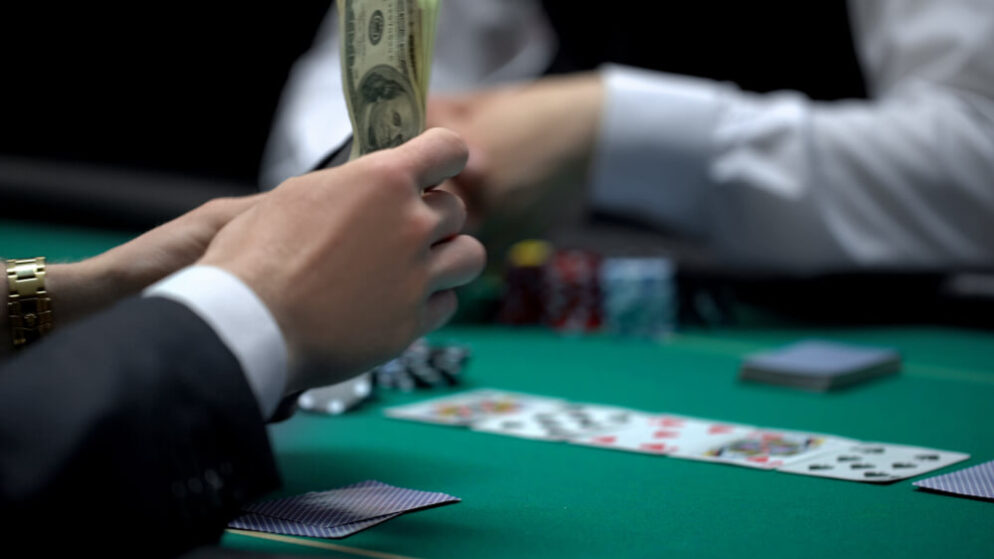

Running an illegal gambling operation might seem like a lucrative venture on the surface, promising quick gains and a steady flow of revenue. However, diving into the realm of illicit gambling is a dangerous endeavour with severe consequences. Just ask Gal Yifrach, a high-stakes poker player who recently found himself entangled in an illegal gambling and money laundering case.
Gal Yifrach’s Case:
Last year, Renowned poker player Gal Yifrach, boasting a substantial $2.1 million in live tournament earnings, found himself in the midst of legal turmoil. The unfolding case exposed Yifrach’s alleged involvement in running an illegal gambling business in California, a stark departure from his celebrated poker career.
When the case was first announced, U.S. Attorney Phillip A. Talbert brought charges against several defendants, shedding light on a complex web of illicit activities. These defendants included:
Defendant #1 Gal Yifrach (35):
Yifrach was charged with operating an illegal gambling business, as well as conspiracy to commit money laundering. Yifrach, recognized for his prowess in poker stood accused of running the illicit gambling business in California. The operation reportedly involved the supply, operation, and maintenance of video slot machines and devices.
Yifrach is alleged to have laundered the proceeds using chips obtained from a legal poker room near his residence. So how did he pull this off? Yifrach is accused of obtaining poker chips from a legal poker room. These chips, typically associated with lawful gambling establishments, acted as a veil for the origins of the illicit profits.
This next step probably involved blending the unlawfully acquired funds with legitimate transactions occurring within the legal poker room. Yifrach likely introduced the illicit funds by using poker chips, which would allow him to create a semblance of legality.
Yifrach would also strategically insert the poker chips, representing the proceeds of the illegal gambling operation, into games or activities within the legal poker room. This step was very important for combining the unlawful funds into the larger, legal gambling environment.
The goal was to withdraw the poker chips or convert them into a more liquid form, such as cash. This maneuver further distanced the income from their unlawful origin, making it challenging to trace the funds back to the illegal gambling operation. Once converted, the funds would easily be circulated through various channels, creating complexity in tracking the money trail.
Defendant # 2 Nick Shkolnik (39):
Nick Sckolknik, on the other hand, a close associate was charged with operating an illegal gambling business. The accusations against Shkolnik also included operating an illegal gambling business.
Defendant #3 and #4 Shalom Ifrah (39) & Schneur Zalman Getzel Rosenfeld (33):
Shalom Ifrah, aged 32, and Schneur Zalman Getzel Rosenfeld, aged 33, also both found themselves facing charges of conspiracy to commit money laundering. In the complex world of high-stakes poker and gambling, these charges underscore the legal risks that can accompany gambling businesses created beyond the tables.
Yifrach is said to have operated unlicensed slot machines across multiple locations in California. According to authorities, the illegal gambling business ran from March 2018 to July 2020. Interestingly, this time frame coincides with Yifrach’s significant poker achievement, as he secured a WSOP bracelet in 2018 by winning the $3,000 six-max no-limit hold’em event.
Yifrach emerged victorious in a field of 868 total entries, claiming a substantial prize of $461,798. The juxtaposition of these accomplishments adds a layer of intrigue to the unfolding legal proceedings,
Last year’s unsealed indictment provided a detailed look into the inner workings of the alleged illegal gambling operation, with particular attention on Gal Yifrach’s role as its manager. The operation, as outlined in the legal document, honed in on the provision, operation, and upkeep of video slot machines and devices.
The legal consequences for the defendants in this case are substantial, as the indictment outlines the forfeiture of assets exceeded $500,000 and the seizure of three real estate properties in California. If convicted, each defendant faces a potential sentence of up to 25 years in federal prison.
Things worsen for Yifrach in 2024
The legal proceedings against high-stakes poker player Gal Yifrach have taken a complex turn, with the federal authorities assembling a staggering 142,689 pages of evidence against him. Yifrach faces charges related to running an illegal gambling operation with the case has unfolding for nearly two years.
The recent development in the United States Court Eastern District of California reveals that both defense and prosecution attorneys have agreed to postpone the scheduled January 8 status conference to March 4. This delay is intended to provide defense attorneys with ample time to acquaint themselves with the extensive case details, review huge discovery materials, discuss the case with their clients, and adequately prepare for the impending trial, as stated in court documents.
In 2022, following his arrest, the court initially deemed Gal Yifrach, a 2018 World Series of Poker (WSOP) bracelet winner, as a flight risk. Consequently, he was ordered to be detained while awaiting trial. However, Yifrach has since been able to secure bail and has been released from custody.
As mentioned earlier, the money laundering aspect of the indictment against Gal Yifrach involved the alleged process of taking cash generated from the illegal casino operation and exchanging it for clean money. According to federal authorities, however, Yifrach is also accused of using these laundered funds to invest in real estate and make other purchases.
The allegations against Gal Yifrach include various methods of money laundering, with one strategy involving the exchange of purported illegal gambling revenue for casino chips at a location referred to as “Casino 1” in Bell Gardens, California. According to authorities, Yifrach would then proceed to take these casino chips to the same casino, exchanging them for checks.
Final Thoughts
These checks were subsequently deposited into his bank account, serving as a means to legitimize the funds derived from the alleged illegal gambling operation. Money laundering through casino transactions is a common technique used to obscure the illicit origins of funds, and if proven, it could carry severe legal consequences for Yifrach.



